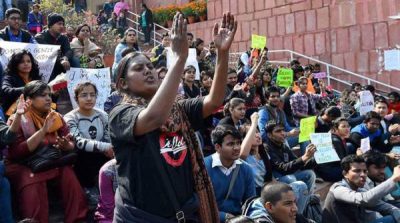By
Ananya S Guha
There is a crisis in one of the country’s leading universities. People are talking about it, writing about it and of course reading about it.
Many are not sure what has happened, there are different versions and interpretations, there is talk about videos being doctored, as the prime television channels, as they are wont to do, quickly capitalized on the happenings in JNU for some of our gullible masses to swallow.
The debate by and large is sharply divided. One group: why castigate an entire university known for it great teachers and social scientists? The second category, also very vociferous, says that all who raised anti Indian slogans must be punished by the law, JNU or no JNU. No one is quite sure as to what exactly these slogans were, and thirdly the interpretation of the word ‘sedition’ is being furiously debated.
Now this raises pertinent questions as to the functions of a university, its pivotal role in enhancing learning, research, cultural activities and enhancing the much touted teacher-student relationship which has remained in India at least an arcane myth. It is very well known that college and university campuses are highly politicised, it is a known fact that many students’ unions are affiliated to political parties, and it is also proven that during student elections, politicians hob nob with their ring leaders openly in campuses- a practice which must be done away with. But the point is that if the teachers and Heads of Institutions openly and shamelessly flout their political allegiances, how can the situation be different? Why only blame the students? Selections in university campuses are biased, most of them take place after some recommendation either of a political leader, or someone who has got political clout.
Campus unrest in the country is nothing new. In fact a Vice Chancellor was shot dead in Jadavpur University almost four decades back, if not more. There has been unrest in Calcutta University, Presidency College, colleges in Delhi, more recently in Hyderabad and Jawaharlal Nehru University. But the ominous sign is that they are getting more and more politicised: caste issues, ideological issues, loyalty to political parties, and now if it really happened, the warning signal: Anti Indian slogans. The question is why? Who are at the helm of this, are they politicians, are they student leaders, are they naxalites, extremists or what? Or to circumvent this: did this actually take place, or even if it did, does it reflect the mindset of students and teachers?
The teachers and students of JNU see this entire thing as a game plan to dishonour a University, where getting admission is tough, where there are eminent social scientists and thinkers, and a university which has a distinguished alumni. So a university as a whole cannot be tarnished because of that episode. But the fact is that even from last year public innuendoes were made against this university, calling it a den of iniquity, so on and so forth. This is patently unfair, and this over the months must have riled students and teachers and climaxed into something similar to what recently happened. We have to remember that herd mentality works in any community: religious, ethnic, and in this case the teacher student community, loosely an academic community.
The solution as I can see it lies in the extirpation of political behaviour in campuses, but this can happen only when appointments of academic staff is apolitical.



No Comments Yet!
You can be first to comment this post!